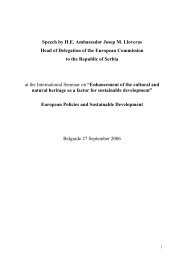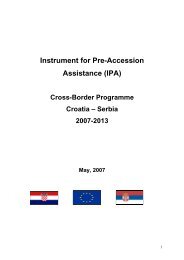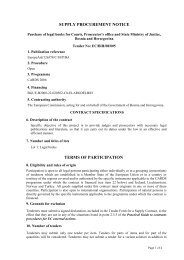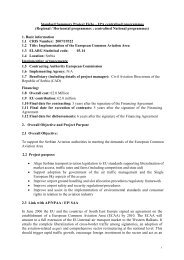YOUR SCHOLARSHIP IN EUROPE
YOUR SCHOLARSHIP IN EUROPE
YOUR SCHOLARSHIP IN EUROPE
Create successful ePaper yourself
Turn your PDF publications into a flip-book with our unique Google optimized e-Paper software.
66<br />
Your Scholarship in Europe 2008-2009<br />
France<br />
BASIC <strong>IN</strong>FORMATION ABOUT FRANCE<br />
France lies on the western fringe of the European continent. The country’s territory also includes<br />
the island of Corsica in the Mediterranean and several overseas areas and territories.<br />
France shares common borders with Belgium, Luxembourg, and Germany in the north and<br />
northeast, Switzerland, Italy, and Monaco in the east, and Spain and Andorra in the south. Its<br />
landmass is washed by the Mediterranean in the southeast and it is open to the Atlantic Ocean<br />
in the west. The country’s capital is Paris. France has a population of 60.4 million. The offi cial<br />
language is French.<br />
HIGHER EDUCATION SYSTEM<br />
The higher education system in France is based on a common European principle (LMD) and<br />
built around the number of years a person can study after fi nishing school (and receiving a<br />
degree called baccalauréat français).<br />
Briefl y, the three higher education degrees require the following qualifi cations: Bachelors degree<br />
(Baccalauréat) + three years of study at an institution of higher learning = Licentiates<br />
degree (Licence, 180 credits ECTS); Bachelors degree + fi ve years of study at an institution of<br />
higher learning = Masters degree (Master, 300 credits ECTS); and Bachelors degree + eight<br />
years of study = Doctors degree (Doctorat, PhD). These three degrees, Licentiate, Masters,<br />
and Doctors, are the basic stages of learning in the French higher education system.<br />
France has 87 state-fi nanced universities, where a wide variety of subjects are taught. Doctorate<br />
studies have traditionally been widely open to foreign researchers; in fact, one in every four<br />
PhD dissertations comes from a foreign doctorate scholar.<br />
Higher schools (Grandes Ecoles) are specifi c French educational institutions on a par with<br />
universities. These educational institutions very carefully select students, since they offer very<br />
high standard education. Educational programmes are tailored to suit the students who want<br />
to receive a basic Masters degree (after fi ve years of study) or intermediate degrees, such as<br />
an international standard Bachelors degree (after three years of training), or a Masters degree<br />
in natural sciences (Master of Science, requiring four or fi ve years of study), or a Specialist<br />
Masters degree (Mastere Specialisé, six years of learning).<br />
Specialized schools, which supplement the French higher education system with professions<br />
such as the arts, fashions, architecture, tourism, and hotel business.<br />
The French education system is distinct, among other things, in that educational institutions<br />
receive solid fi nancial support from the government, which means that French and
















